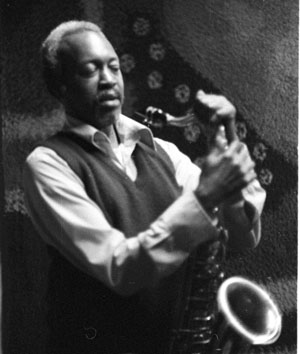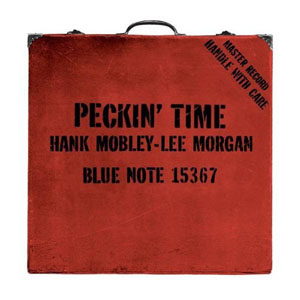Stretchin' Out – Hank Mobley
One of Hank's many melodic uptempo tunes with a 32-bar AABA form, this one has a pedal point on the first 4 bars of the A sections that really builds momentum.
- Recording: Hank Mobley - Peckin' Time
- Recorded on: February 9, 1958
- Label: Blue Note (BLP 1574)
- Concert Key: F
- Vocal Range: , to
- Style: Swing (uptempo)
- Trumpet - Lee Morgan
- Tenor Sax - Hank Mobley
- Piano - Wynton Kelly
- Bass - Paul Chambers
- Drums - Charli Persip
0:00
0:00
Buy MP3
Video
- Description
- Historical Notes
- Solos
- Piano Corner
- Bass Corner
- Drum Corner
- Guitar Corner
- Inside & Beyond
- Minus You
Stretchin' Out is a memorable and fun bebop-inspired head. The eight-measure rhythm section intro on the recording has the piano soloing over a rhythmic pedal that is also played under the first four measures of the melody in each A section of this AABA format. This pedal gives a rhythmic drive which contrasts with the longer lines that burst out after the rhythmic pedal stops.
Our audio excerpt starts at the beginning of the melody and continues through the B section. The B section is written in a call-and-response style, with two bars of composed melody followed by an improvised answer. We've notated Hank's classic answers in all lead sheet editions.
The solo section swings throughout. When the solo chord progression is different from the melody, the solo changes are written under the staff. The Coda starts with two four-measure breaks for a soloist. Hank's four-measure statements are so classic we couldn't resist notating them in the B-flat edition.
Our audio excerpt starts at the beginning of the melody and continues through the B section. The B section is written in a call-and-response style, with two bars of composed melody followed by an improvised answer. We've notated Hank's classic answers in all lead sheet editions.
The solo section swings throughout. When the solo chord progression is different from the melody, the solo changes are written under the staff. The Coda starts with two four-measure breaks for a soloist. Hank's four-measure statements are so classic we couldn't resist notating them in the B-flat edition.
"Peckin' TIme" was recorded at Rudy Van Gelder's legendary Hackensack Studio.
The album "Peckin' Time" was the third recording to feature Hank Mobley and Lee Morgan in a quintet setting; the previous two, from November 1956, were issued as the albums "Jazz Message #2" (Mobley) and "Introducing Lee Morgan." These sessions contain two classic Doug Watkins compositions, Bet and Doug's Minor Bo'k. Interestingly, all the players on "Peckin' Time" except Paul Chambers had played extensively in Dizzy Gillespie's big band in the mid-'50s.
Check out drummer Charli Persip talking about joining Dizzy's band on jazzleadsheets.com's YouTube channel. Charli also talkes about recording The Eternal Triangle on YouTube.
From this same session you can also check out Peckin' Time, High And Flighty and Git-Go Blues.
The album "Peckin' Time" was the third recording to feature Hank Mobley and Lee Morgan in a quintet setting; the previous two, from November 1956, were issued as the albums "Jazz Message #2" (Mobley) and "Introducing Lee Morgan." These sessions contain two classic Doug Watkins compositions, Bet and Doug's Minor Bo'k. Interestingly, all the players on "Peckin' Time" except Paul Chambers had played extensively in Dizzy Gillespie's big band in the mid-'50s.
Check out drummer Charli Persip talking about joining Dizzy's band on jazzleadsheets.com's YouTube channel. Charli also talkes about recording The Eternal Triangle on YouTube.
From this same session you can also check out Peckin' Time, High And Flighty and Git-Go Blues.
Related Songs
Email Send Stretchin' Out to a friend
Send this page to a friend via email. Add your name or email in the first field. In the second, add one or more email addresses, separated by a comma.

Hank Mobley
July 7, 1930 – May 30, 1986
Hank Mobley is one of the most acclaimed tenor saxophonists in modern jazz history. He is recognized by musicians and critics alike as one of the most important and eloquent jazz instrumentalists of all time. He recorded well over 100 of his own original compositions and left an indelible mark on the post-bop jazz scene. Read more...
There was a problem.
...

